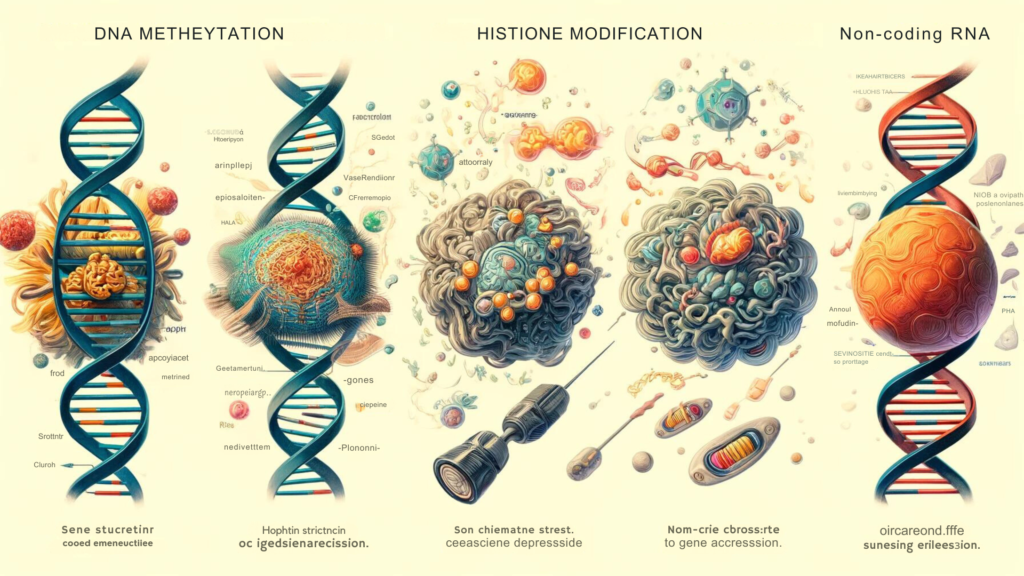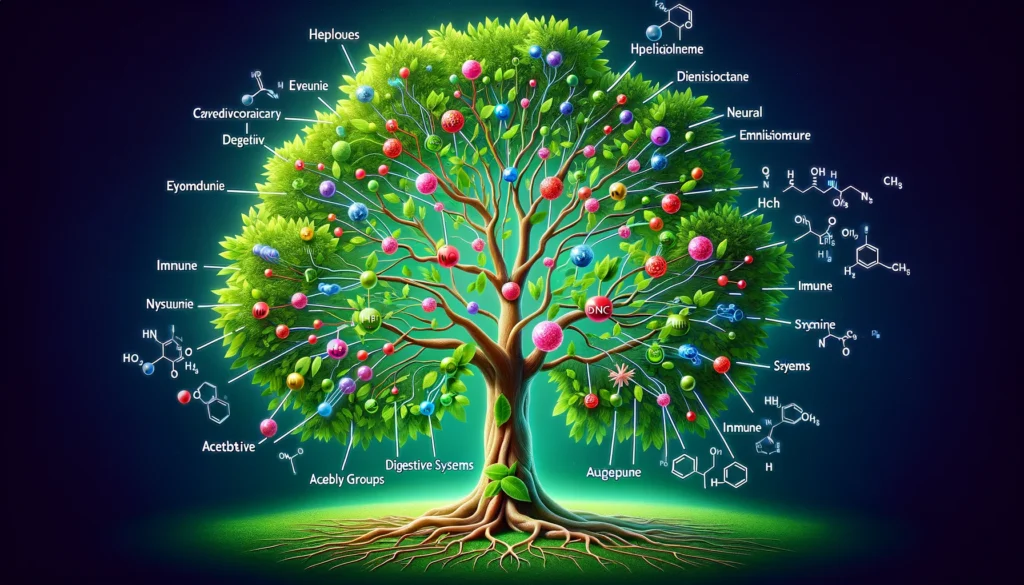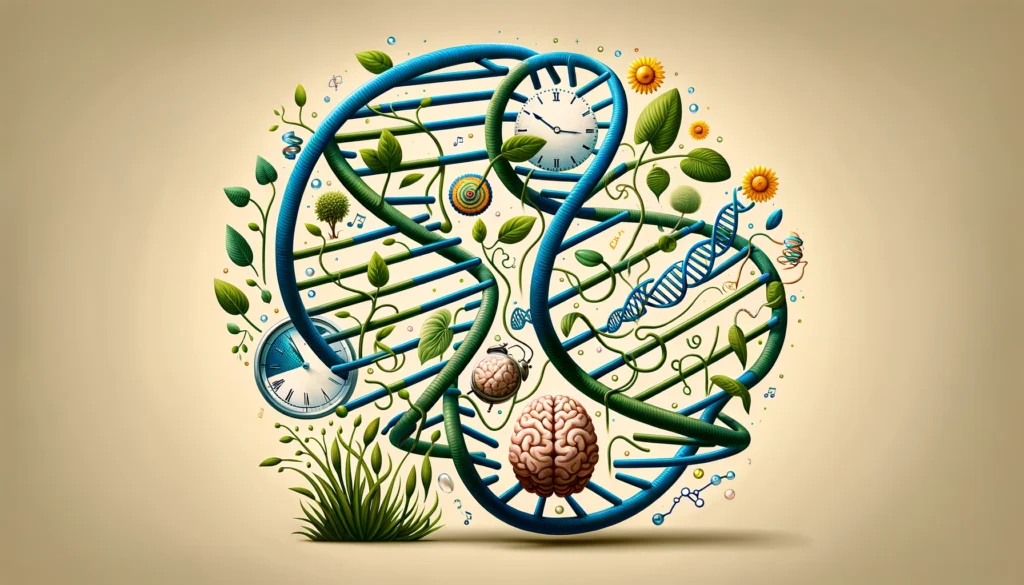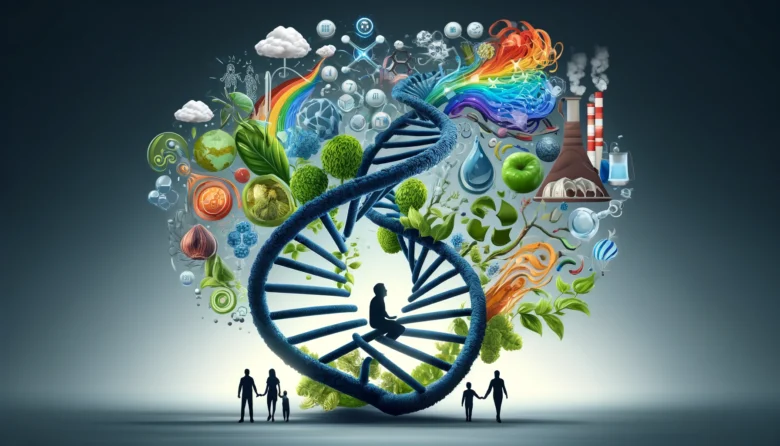Epigenetics is a fascinating field of biology that examines the chemical modifications of DNA and histone proteins, which affect gene expression without altering the underlying DNA sequence. This area of study extends our understanding of genetics beyond the simple sequence of nucleotides in DNA to include the dynamic and reversible processes that regulate gene activity and determine cellular function.
The concept of epigenetics is not new; it dates back to the early 20th century, but it gained significant momentum in the late 1990s and early 2000s with the advent of modern molecular biology techniques. These advances have enabled scientists to explore how external factors and lifestyle choices can influence gene expression and, subsequently, an individual’s health and susceptibility to disease.
Epigenetics bridges the gap between genetics and environmental influences, offering insights into how the same genetic code can produce different phenotypes depending on the epigenetic landscape. This understanding shifts the paradigm of genetics, emphasizing that our DNA is not solely our destiny; rather, it is a part of a complex system of biological regulation and environmental interaction. Through the study of epigenetics, we can appreciate the subtle yet profound ways in which life experiences and environmental factors shape our biological inheritance and overall health.
Basic Concepts of Epigenetics
Epigenetics revolves around the study of heritable changes in gene function that do not involve alterations in the DNA sequence. This complex field is underpinned by several key mechanisms, including DNA methylation, histone modification, and the activity of non-coding RNA, each playing a pivotal role in regulating gene expression and cellular activity.
DNA Methylation is one of the most extensively studied epigenetic mechanisms. It involves the addition of a methyl group to the DNA molecule, typically at the cytosine base in a CpG dinucleotide. This modification can change the activity of a DNA segment without changing the sequence. When DNA methylation occurs in the promoter region of a gene, it typically acts to repress gene transcription, effectively silencing the gene. This process is crucial for normal development, as it regulates genes that should be turned off in a particular cell type or at a specific developmental stage.

Histone Modification involves the chemical alteration of histone proteins around which DNA is wrapped in the cell nucleus. Histones can be modified through the addition or removal of various chemical groups, such as methyl, acetyl, or phosphate groups. These modifications can affect how tightly or loosely DNA is wound around the histones, thus controlling the accessibility of genes to the cellular machinery that reads and executes their instructions. For example, acetylation of histones is generally associated with transcriptional activation, as it loosens the DNA-histone interaction, making the DNA more accessible for transcription.
Non-coding RNA molecules, particularly microRNAs (miRNAs) and long non-coding RNAs (lncRNAs), are also crucial in the epigenetic regulation of gene expression. These RNA molecules do not code for proteins but can regulate gene expression at the post-transcriptional level. MicroRNAs bind to messenger RNA (mRNA) molecules and can either degrade them or inhibit their translation into proteins, thereby influencing gene expression indirectly. Long non-coding RNAs can interact with both DNA and proteins to form complexes that modify the chromatin structure and regulate gene expression in various ways.
The epigenome refers to the complete set of epigenetic marks that can be inherited during cell division and across generations. It acts as a cellular memory, carrying information about the environmental conditions and physiological states that have influenced an organism’s development. Understanding the epigenome and its mechanisms allows scientists to decipher how genes are turned on or off and how their expression levels are fine-tuned in response to internal and external stimuli. This intricate regulation of gene expression is essential for normal development, cellular differentiation, and the maintenance of cellular identity and function throughout an organism’s life.
Epigenetics in Health
Epigenetics plays a critical role in maintaining health by regulating gene expression in response to changing internal and external environments. It is central to normal development, cellular differentiation, and the functioning of various physiological processes. The dynamic nature of epigenetic modifications allows cells to respond to environmental stimuli and developmental cues, ensuring that genes are expressed at the right time, in the right place, and at the appropriate level.
During development, epigenetic mechanisms such as DNA methylation and histone modification guide the process of cellular differentiation, enabling a single fertilized egg to develop into a complex organism with various types of specialized cells. Each cell type has a unique epigenetic profile that determines which genes are active or inactive, ensuring that cells function properly in their specific context within the body. For example, epigenetic regulation ensures that genes specific to liver function are expressed in liver cells but silenced in brain cells, and vice versa.

Moreover, epigenetics is fundamental to the process of imprinting, where certain genes are expressed in a parent-of-origin-specific manner. This selective expression is crucial for normal development and health, as it contributes to the balance of growth and metabolic activities within the organism.
In adults, epigenetic regulation continues to play a vital role in maintaining cellular homeostasis and responding to environmental changes. For instance, lifestyle factors like diet, exercise, and stress management can positively influence epigenetic mechanisms, leading to improved health outcomes. Nutritional components can affect DNA methylation patterns and histone modifications, thereby influencing gene expression related to metabolism, immune response, and cell growth. Regular physical activity has been shown to induce beneficial epigenetic changes that enhance metabolic health and reduce the risk of chronic diseases such as obesity, type 2 diabetes, and cardiovascular disease.
Additionally, the concept of epigenetic memory is important in understanding how cells remember past events, such as exposure to stress or inflammation, and how these memories can influence future gene expression and health outcomes. This aspect of epigenetics is crucial for understanding the long-term impacts of environmental exposures and lifestyle choices on an individual’s health.
Epigenetics in Disease
The intricate world of epigenetics, while crucial for normal health and development, also plays a significant role in the pathogenesis of various diseases. Aberrant epigenetic modifications can disrupt normal gene function and expression patterns, leading to the onset and progression of many illnesses, including cancer, neurodegenerative disorders, and cardiovascular diseases.
Cancer is perhaps the most studied area concerning epigenetic abnormalities. In many types of cancer, abnormal DNA methylation patterns, such as hypermethylation of tumor suppressor gene promoters, lead to their silencing, thus facilitating uncontrolled cell growth and tumor development. Conversely, hypomethylation can activate oncogenes and promote malignancy. Histone modifications also contribute to cancer, as changes in the chromatin structure can result in the misregulation of genes critical for cell cycle control, apoptosis, and DNA repair. The reversible nature of epigenetic changes makes them appealing targets for cancer therapy, with drugs designed to specifically alter these modifications and restore normal gene expression patterns.

In the realm of neurodegenerative diseases such as Alzheimer’s and Parkinson’s, epigenetic mechanisms have been implicated in neuronal loss and dysfunction. Changes in DNA methylation and histone acetylation patterns have been observed in the brains of affected individuals, affecting genes involved in synaptic plasticity, neuronal survival, and inflammatory pathways. These alterations can contribute to the progressive loss of neuronal function and the characteristic pathologies of these diseases. Research in this area holds promise for developing epigenetic-based interventions that could potentially halt or reverse the neurodegenerative process.
Cardiovascular diseases also have a strong epigenetic component, with changes in gene expression linked to the development of atherosclerosis, hypertension, and heart failure. Epigenetic modifications can influence the expression of genes involved in lipid metabolism, inflammation, and vascular function, thereby affecting the risk and progression of cardiovascular conditions. Lifestyle factors such as diet, smoking, and physical activity can induce epigenetic changes that either predispose to or protect against cardiovascular diseases, highlighting the potential for epigenetic lifestyle interventions in disease prevention and management.
Moreover, epigenetics plays a role in the development of metabolic diseases like diabetes and obesity. Epigenetic changes can affect the expression of genes related to glucose and lipid metabolism, insulin signaling, and adipocyte differentiation, contributing to the complex etiology of these conditions. These modifications may occur early in life or even prenatally, influenced by maternal nutrition and environmental exposures, and can have long-lasting effects on health and disease risk.
The concept of epigenetic therapy has emerged as a novel approach to treating diseases with an epigenetic basis. By targeting the specific epigenetic alterations associated with a disease, researchers aim to correct the aberrant gene expression patterns and restore normal cellular function. Drugs that inhibit DNA methyltransferases or histone deacetylases are already in use for certain types of cancer, and ongoing research is focused on developing more specific and effective epigenetic therapies for a range of diseases.
Environmental Influence on Epigenetics
The environment plays a pivotal role in shaping the epigenetic landscape, influencing gene expression through various mechanisms. Lifestyle factors, dietary habits, stress, and exposure to pollutants can all induce epigenetic changes that affect health and disease risk, often with long-lasting effects.
Diet and Nutrition are among the most significant environmental factors affecting epigenetics. Nutrients can serve as substrates or cofactors for enzymes that catalyze DNA methylation and histone modifications. For example, folate and other B vitamins are crucial for the methylation process, influencing DNA methylation patterns and potentially affecting gene expression. Bioactive compounds in foods, like polyphenols found in fruits and green tea, can also modify epigenetic marks, impacting gene activity and offering protection against diseases like cancer and cardiovascular disorders.
Physical Activity has been shown to induce beneficial epigenetic changes. Regular exercise can alter the methylation status of genes involved in energy metabolism, insulin response, and inflammation. These epigenetic adaptations can enhance metabolic health, improve insulin sensitivity, and reduce the risk of metabolic disorders, highlighting the role of physical activity in epigenetic regulation and disease prevention.

Stress and Psychological Factors can lead to epigenetic alterations as well. Chronic stress has been associated with changes in DNA methylation and histone modifications that can affect the hypothalamic-pituitary-adrenal (HPA) axis, altering the body’s stress response. These changes can influence mental health and contribute to the development of psychiatric disorders, including depression and anxiety.
Environmental Pollutants such as heavy metals, pesticides, and air pollutants can disrupt epigenetic mechanisms, leading to altered gene expression and increased disease susceptibility. For instance, exposure to air pollution has been linked to DNA methylation changes in genes related to inflammation and oxidative stress, increasing the risk of respiratory and cardiovascular diseases.
The concept of transgenerational epigenetic inheritance suggests that some epigenetic changes induced by environmental factors can be passed down to subsequent generations, affecting the health and disease risk of offspring. This area of research is particularly intriguing, as it implies that the effects of environmental exposures can extend beyond the individual to affect future generations.
Challenges and Future Directions in Epigenetic Research
Epigenetic research, while promising, faces several challenges that must be addressed to fully unravel the complexities of epigenetic regulation and its implications for health and disease. These challenges include technological limitations, the dynamic nature of epigenetic marks, and ethical concerns.
One of the primary technological challenges is the need for more sophisticated and sensitive tools to accurately map and quantify epigenetic modifications across the genome. Current methods often require large amounts of starting material, which can be a limitation when working with rare cell types or clinical samples. Additionally, distinguishing between causation and correlation in epigenetic studies is difficult, necessitating the development of more refined experimental and analytical approaches to establish clear links between specific epigenetic changes and biological outcomes.
The dynamic and reversible nature of epigenetic marks also poses a challenge. These changes can occur rapidly in response to environmental stimuli or during different developmental stages, making it difficult to capture and analyze them accurately at specific time points. This dynamic aspect requires longitudinal studies and real-time monitoring to understand how epigenetic modifications evolve and influence gene expression over time.

Ethical concerns arise particularly in the context of epigenetic therapy and the potential for heritable epigenetic modifications. The prospect of altering epigenetic marks to treat or prevent disease is promising but also raises questions about long-term effects, unintended consequences, and the possibility of heritable changes that could affect future generations. Ethical guidelines and rigorous testing are essential to ensure that epigenetic therapies are safe and effective.
Looking to the future of epigenetic research, several directions are particularly exciting. One is the development of precision epigenetic therapies that can target specific genes or pathways involved in disease, offering more effective and personalized treatment options. Another is the integration of epigenetics with other omics technologies, such as genomics, proteomics, and metabolomics, to provide a more comprehensive understanding of biological systems and disease processes.
Advancements in machine learning and artificial intelligence are also expected to play a significant role in analyzing the vast amount of data generated by epigenetic studies, helping to identify patterns, predict outcomes, and uncover new therapeutic targets.
Conclusion
The exploration of epigenetics has unveiled a complex layer of biological regulation that extends beyond the DNA sequence, offering profound insights into the mechanisms that govern health and disease. This field has revealed how environmental factors, lifestyle choices, and inherited epigenetic marks interact with the genome to influence gene expression and phenotype. The dynamic and reversible nature of epigenetic modifications provides a bridge between our genetic blueprint and the external world, highlighting the plasticity and adaptability of our biological systems.
Epigenetic research has opened new frontiers in understanding the etiology of complex diseases, from cancer and neurodegenerative disorders to metabolic and cardiovascular conditions. It has challenged the deterministic view of genetics, proposing a more nuanced model where gene-environment interactions are pivotal in shaping individual health outcomes. Furthermore, the potential of epigenetic therapies offers exciting possibilities for personalized medicine, where treatments can be tailored to the specific epigenetic profiles of individuals.
However, the journey into the epigenetic landscape is not without its challenges. The field requires sophisticated tools and methodologies to decipher the intricate patterns of epigenetic modifications and their functional consequences. Ethical considerations, particularly in the realm of heritable modifications and epigenetic therapies, demand careful deliberation and regulation.

As we continue to delve deeper into the epigenetic mechanisms that influence our biology, we stand on the cusp of significant scientific and medical advancements. The promise of epigenetics to transform our understanding of gene regulation and disease manifestation is vast, heralding a new era in biomedical research and therapeutic intervention.
Author’s Note
As we venture into the intricate world of epigenetics, it is important to recognize the vast potential and the complexities this field presents. This blog aims to shed light on the pivotal role of epigenetics in shaping our health and disease outcomes, emphasizing the importance of ongoing research and ethical considerations. I encourage readers to delve deeper into this fascinating area of science, which holds the promise of revolutionizing our approach to medicine and healthcare.
G.C., Ecosociosphere contributor.
References and Further Reading




